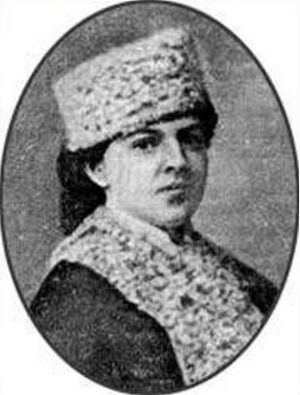Elizaveta Litvinova facts for kids
Elizaveta Fedorovna Litvinova (born 1845, died around 1919) was an important Russian mathematician. She was also a teacher, meaning she studied how people learn and how to teach them well. Elizaveta wrote more than 70 articles about teaching mathematics.
Contents
Early Life and Education
Elizaveta Fedorovna Ivashkina was born in 1845 in Russia, which was then ruled by a czar. She went to a women's high school in Saint Petersburg for her early education.
Marriage and Early Studies
In 1866, Elizaveta married Viktor Litvinov. At that time, it was hard for women to study at universities, especially abroad. Unlike some other women, Elizaveta's husband did not let her travel to Europe for university studies. So, Elizaveta began to study privately with a teacher named Strannoliubskii. He also taught another famous Russian mathematician, Sofya Kovalevskaya.
Studying in Zürich
In 1872, after her husband passed away, Litvinova moved to Zürich, Switzerland. She enrolled at a special technical school there called a polytechnic institute.
Defying the Czar's Order
In 1873, the Russian czar made a rule that all Russian women studying in Zürich had to go back home. If they didn't, they could face serious problems. Elizaveta Litvinova was one of the few brave women who chose to stay. She ignored the czar's order and kept studying. She earned her first university degree (a baccalaureate) in Zürich in 1876. Then, in 1878, she earned her highest degree, a doctorate, from the University of Bern.
Career and Later Life
When Litvinova returned to Russia, she faced difficulties. Because she had defied the czar's order in 1873, she was not allowed to get a job at a university.
Teaching and Writing
Instead, Elizaveta Litvinova taught at a women's high school. To earn more money, she also wrote biographies of other famous mathematicians. These included books about Sofya Kovalevskaya and the ancient Greek thinker Aristotle.
Later Years
After she retired from teaching, it is thought that Elizaveta Litvinova died around 1919. This was during the time of the Russian Revolution, a period of great change and conflict in Russia.
See also
 In Spanish: Elizaveta Fedorovna Litvinova para niños
In Spanish: Elizaveta Fedorovna Litvinova para niños
 | Lonnie Johnson |
 | Granville Woods |
 | Lewis Howard Latimer |
 | James West |


